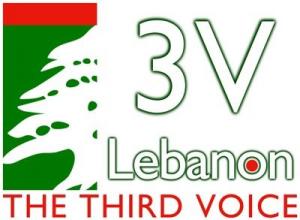The Third Voice for Lebanon
Aimee Karam, St. Georges Hospital, Beirut, Lebanon
 In the midst of a crisis, when a Nation was stuck in the whirlwind of divisiveness, a black or white tunnel of thinking, intense conflicts, anger, injustice, sorrow, and violence, a group of people, all Lebanese citizens, from different religions, professional and cultural backgrounds, came together and founded The Third Voice for Lebanon. The 3V, as we call it, is an independent, non-partisan, non-sectarian, and non-political, pro-active Think Tank. It is issued from the Civil Society and to the Civil Society.
In the midst of a crisis, when a Nation was stuck in the whirlwind of divisiveness, a black or white tunnel of thinking, intense conflicts, anger, injustice, sorrow, and violence, a group of people, all Lebanese citizens, from different religions, professional and cultural backgrounds, came together and founded The Third Voice for Lebanon. The 3V, as we call it, is an independent, non-partisan, non-sectarian, and non-political, pro-active Think Tank. It is issued from the Civil Society and to the Civil Society.
A third Voice is a movement that has always existed throughout the world. It offers a positive and sustainable alternative when countries confront stagnation and crisis.
As political governance and parties were failing in bringing justice, peaceful, effective, and transparent solutions, we strongly believed that solutions could emerge from the Lebanese Civil Society. We aimed to encourage Lebanese citizens to work collaboratively in order to promote and peacefully preserve the uniqueness and the diversity of the Lebanese social fabric, and strengthen the concept of citizenship as a unifying identity.
We wanted to make mentalities evolve and forge new attitudes and perceptions, meeting the principles of secularism, equality, justice, transparency, and meritocracy. We need finally to create a hub of active, constructive, and civil attitudes and to encourage a sustainable dynamic of development and peace-building.
The Third Voice for Lebanon mainly works on four substantive parameters which are: Citizenship, Dialogue, Neutrality, and Peace. Our goal is to bring awareness about these fundamental topics.
- About Citizenship: Define and promote the Lebanese Citizenship through conferences and published texts in order to let all the Lebanese people understand that Citizenship is what could bring us together and let us live together, while respecting our and others’ respective identities. We have one Citizenship which is our common belonging.
- About Dialogue: Establish dialogue between the different parties with precise rules, allowing dialogue to take place successfully and willingly and be prepared.
- About Neutrality: Set a project with all the components of the Lebanese society aiming for the Neutrality of Lebanon, which is the only salvation to reach peace. Civil and political neutrality keep us away from regional conflicts and ensure a cohesive society.
Citizenship, Dialogue, and Neutrality are the core of actions that we strongly believe, will lead us to sustainable solutions and peace. Besides these actions, we have worked on social matters, such as civil marriage, sexual orientation, mental health and women’s rights.
About civil marriage, it could be a first step towards a mentality change in favor of a secular approach. It would ensure equality of personal status to all. This is because civil marriage symbolizes freedom of choice; a choice allowing two individuals to govern their own union. This is also where women can be equal to men, and can protect their rights without being trapped by religious laws, so people can choose civil or religious marriage, or both. About sexual orientation such as homosexuality, we worked against its criminalization and implementation and equality to all.
We celebrate each year the International Day of Peace, on September 21st.
And to increase awareness among the young generation, we have launched on that day, a national competition among public and private schools of Lebanon, with the collaboration and support of the Ministry of Education, focusing on the topic: “How do you conceive and imagine Peace in Lebanon”, through writing, video’s, drawing, painting, etc…
“The Third Voice For Lebanon” is an example of how Psychology has been applied to raise activism of the civil society and resilience against adversities in conflictual national politics. It helped create a movement and an attitude aiming at:
- Reducing conflicts and violence, changing sectarian mentalities and encouraging peace-building.
- Working outside prejudices, toward a civil dialogue
- Training administrators and members of the 3V, toward a collaborative approach, interpersonal effectiveness, and feed-back exchange.
- Using a Strength based approach from a community perspective
- Engaging people and institutions, schools, and universities based-interventions, vulnerable populations
- Identifying innovators, movers and connectors who are urgently needed to make the change
Psychological services could embrace many forms, they are levers for enhancing justice, equity, conflicts reduction, peacebuilding, human rights and healthier communities.

